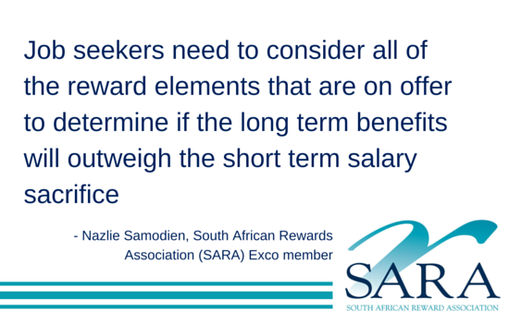 The fabric of the modern organisation is woven by people from a number of different generations. Generation X and Generation Y. The middle generation and the older with a smattering of the youth - each one has its own measure of reward. Each one has to be met on a different level in order for it to thrive in the corporate workplace. Recognising these differences and understanding the value of rewarding the generations on an individual level is of enormous value to the business, both in the short and long term, and more easily managed and controlled when there is a trained reward specialist on hand. “Having an engaged workforce which works for more than just money is extremely valuable to any organisation,” says Martin Hopkins, Exco member of the South African Reward Association (SARA) and partner at PwC. “It also assists in attracting and retaining great employees. By customising the elements of the reward strategy to each generation, the company is able to extract the most value from its employee value proposition – or EVP – and this is where the reward specialist comes in.” A reward specialist plays a vital role in ensuring the corporate reward strategy is in line with the overall business strategy and fits in with generational requirements. The differences between each are often far greater than management realises. Work-life balance, positive personal impact and developmental opportunities are of significant importance to the younger generation. The middle generation is interested in career development, insurance, bursaries for children and time flexibility – rewards which map to their needs and families. The older generation is interested in retirement savings benefits and the more conventional aspects of a reward package such as pay, incentives and share or equity rewards. “The first critical step is to recognise that different generations have different reward needs,” explains Hopkins. “The next is to understand these needs and to recognise which elements of the reward offering are most valued by different generations.” It is more cost-effective for the organisation to customise the non-financial aspects of the employee value proposition to be in tune with specific employee segments than it is to try and satisfy all employees with a monolithic, singular offering. The company is in a unique position to take advantage of the multifaceted skill sets of each generation by recognising their strengths and establishing a culture which respects their individual contributions. “There have been numerous studies undertaken which allow the reward professional to take a more granular and scientific approach to the generational differences,” concludes Martin. “Their skills and training allow them to truly harness the advantages and mitigate many of the generational challenges through well-structured reward programmes.” ENDS MEDIA CONTACT: Cathlen Fourie, 012 644 2833, [email protected], www.atthatpoint.co.za For more information on SARA please visit: Website: www.sara.co.za Twitter: @SA_reward LinkedIn: South African Reward Association Facebook: SARA – South African Reward Association
0 Comments
South Africa is desperate for skilled professionals to urgently bolster economic growth  Martin J R Westcott, the Executive Chairman of P E Corporate Services Martin J R Westcott, the Executive Chairman of P E Corporate Services Fragile markets, stringent visa laws and a surge globally of violence against foreigners have done little to curb businesses sending staff on assignments abroad. South Africa is coming out as a top location for international professionals finding employment, along with its developing BRIC counterparts. “South Africa could do well to embrace in-bound mobility and create total reward packages that speak to the individual needs of these professionals,” says Martin J R Westcott, the Executive Chairman of P E Corporate Services. “The fact that skills shortages in South Africa are both substantial and entrenched is a key factor constraining economic growth.” Westcott, speaking on expatriation trends during a workshop of the South African Reward Association (SARA), identified how the economic slow-down and fewer job opportunities in developed economies are seeing a steady reversal of the country’s net ‘brain drain’. This is combined with a severe slippage of exchange rate and the country’s comparatively high standard of living. “Our most recent international pay comparison studies indicate that South Africa is ranked second only to the United States in terms of purchasing power of the net disposable income enjoyed by executives and professionals,” explained Westcott. Balancing mobility and remuneration “Individuals who are well established in their jobs in the home country will take an off-shore assignment provided that it is financially beneficial for the entire family,” says Nevan Naidoo, the Head of Reward across Africa for the Standard Bank Group. “Employees focusing on career advancement, with ambitions of taking on more senior roles in a global organisation, will see assignments off-shore as a platform for advancement. In these instances planned succession will be a key driver instead of money.” “The appointment of foreign nationals must be contextualised and well understood by local employers to prevent any frustration,” says Naidoo. “While security challenges are one of the main areas that influence expatriation considerably, businesses are creating the necessary awareness regarding operating in Africa specifically,” adds Kohl Van Rensburg, Head of Reward: Africa, Retail Banking and Wealth for the Standard Bank Group. “Companies are being pro-active in making sure they remain safe: that good evacuation processes are in place, excellent global medical cover is provided, and so on.” The division between home country and host country approaches to expatriate remuneration have been near on par for many years. Most expatriates who relocate for short to medium term assignments retain domestic financial commitments which create practical difficulties in switching to a host country pay model. Van Rensburg recommends that businesses adopt the split payroll methodology; where “a percentage of salary is paid in the home country with a smaller percentage paid in the host country, dependant on cost of living indices in the host country.” While there must be correct processes and systems in place to ensure a company’s expatriation policy is well executed, measuring the success of assignments is difficult and dependent on specifics of the assignment, says Westcott: “There has, however, been very strong growth in the use of key performance indicators (KPI) for performance evaluation and bonus determination in recent years and, in particular, the alignment of KPIs with corporate and business unit strategies.” ENDS MEDIA CONTACT: Cathlen Fourie, 012 644 2833, [email protected], www.atthatpoint.co.za For more information on SARA please visit: Website: www.sara.co.za Twitter: @SA_reward LinkedIn: South African Reward Association Facebook: SARA – South African Reward Association Are you being paid what you are worth?
Take home salaries must be addressed to ensure that people earn what they are worth. Salary structures are as varied and different as the organisations that pay them. Some are structured to ensure that the employee gains significant financial rewards; others are not. “It is important for the job seeker to understand if the company is offering a basic pay and benefits or if the company is offering a total package (cost to company),” says Nazlie Samodien, South African Rewards Association (SARA) Exco member. “Take home pay can vary depending on how the company’s remuneration is structured. I’ve seen job seekers earning a basic salary of R15, 000, for example, being offered a total package of R20, 000. They are under the impression that they are being offered an increase of more than 30% without knowing that they must now pay for all the benefits from the total package that is being offered.” According to Samodien there is no rule of thumb on what to ask for on remuneration, it is dependent on the seniority of the role, the scarcity of skills that the job seeker has, the availability of variable remuneration such as commission and the level of experience that the job seeker has to offer. There are a number of considerations that the employee or job seeker needs to take into consideration before accepting a salary offer. Establish payment structure The first is to establish whether or not there is variable pay such as a commission and how the company structures the commission scheme. “I would advise that potential employees ask what the average commission payments have been with other employees in the role over the past six months,” says Samodien. “This will then put them in a better position to understand what measures are used to calculate commission and how hard or easy it will be to earn.” Consider total earnings This incorporates any other incentives provided by the business such as bonus payments or long term incentive schemes. An employee can be worse off if they don’t consider these variable pay elements over both the short and long term. “Depending on what a candidate is sacrificing in their current role they may want to negotiate this on appointment,” says Samodien. “For example, if they are eligible for a bonus with their current employer and the payment is imminent, you can negotiate an on-appointment bonus with the new company. It is also worthwhile asking the new company for a mock payslip so that it is obvious to see what will be paid into the bank account once all the deductions have been made.” “Depending on the role, the successful candidate may need to do a lot of travel and a company car or fuel card may need to be factored in,” says Samodien. “Then there is medical aid, retirement plans and income protection benefits for the employee in the event of death or disability. It is worth asking what the returns on the retirement funds have been over the past five years and what the taxes on these benefits will be.” Work/life balance In addition, it is important that the employee establish those aspects of work-life balance that they need to thrive. Many organisations offer gyms, crèches, wellness centres and more, ensuring that their staff have opportunities to unwind or look after their children. Performance incentives “Some employers have outstanding recognition programmes that are linked to performance and that can include overseas trips and these form part of the employee value proposition,” concludes Samodien. “Job seekers need to consider all of the reward elements that are on offer, especially if the pay element is not quite what was expected, to determine if the long term benefits will outweigh the short term salary sacrifice.” ENDS MEDIA CONTACT: Cathlen Fourie, 012 644 2833, [email protected], www.atthatpoint.co.za For more information on SARA please visit: Website: www.sara.co.za Twitter: @SA_reward LinkedIn: South African Reward Association Facebook: SARA – South African Reward Association |
Archives
March 2023
Welcome to the South African Reward Association newsroom.
Categories
All
|


 RSS Feed
RSS Feed